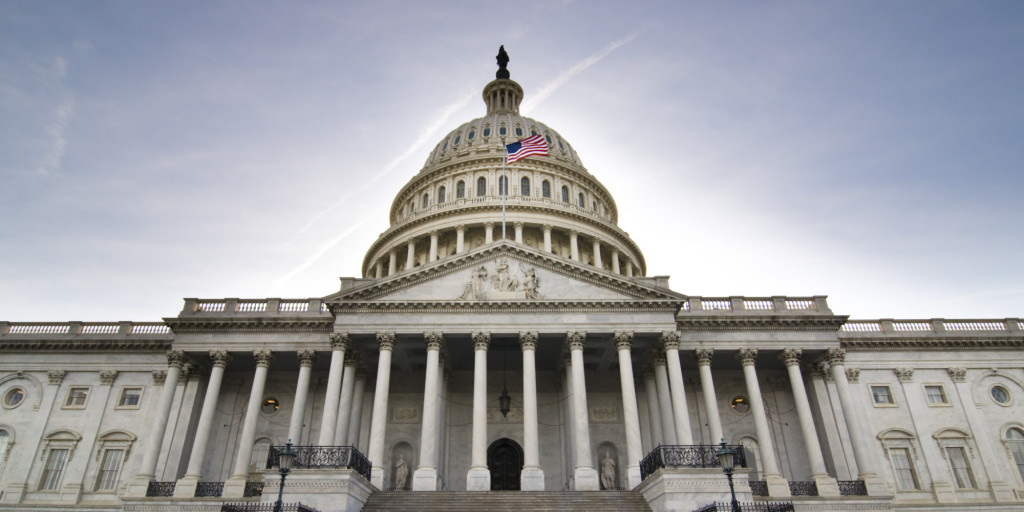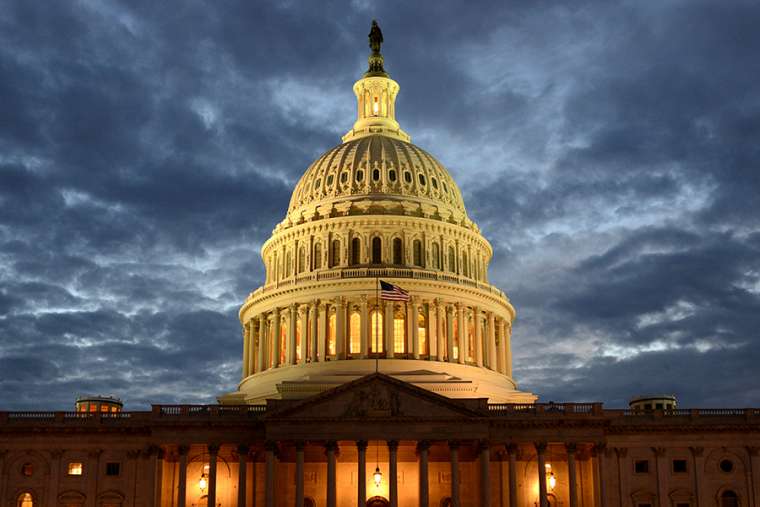Alabamians to vote on Ten Commandments ballot proposal in Nov.

Alabamians will have the chance to vote on wether to allow state properties, such as schools, to display the Ten Commandments in a November election ballot initiative. Voters will cast their ballot for or against SB181, which if approved by the voters would add an amendment to the state constitution that would give properties belonging to the state the option to display the Ten Commandments. The state may not use its money to fund displays, funding must come from private entities. The House of Representatives passed the ballot provision 66-19 on Thursday. The proposal was approved by the Senate last month, and since it’s a Constitutional amendment, it does not need to be signed by Gov. Kay Ivey. Republicans supporters of the proposal say it will reaffirm religious liberty, which is already under law. “I wish and pray that we get to a point where people would be free to express faith without fear of being sued,” said Trussville-Republican state Rep. Danny Garrett. Democratic opponents of the proposal think it would end up doing more harm than good; that it violates the separation of church and state, and would motivate federal lawsuits that could cost the state money. “The Supreme Court and federal courts already ruled. We are going to get sued,” Russell County-Democrat state Rep. Berry Forte, told the Associated Press. “I’m opposed to the bill because it’s unconstitutional and I’m trying to be fiscally conservative to try to save the state and courts money if they put it up there and it gets struck down,” said Lauderdale County-Democrat state Rep. Marcel Black in the same report. “This constitutional amendment is done for feel-good and political purposes.” Black also told AL.com the he believes “the proposal is ‘an old trick’ intended to help draw Republican voters to the polls.” Mobile-Democrat state Rep. Adline Clarke questioned whether people from other religions who displayed similar texts in public places would receive the same treatment, “public places belong to all people regardless of religion,” she told the Associated Press. The proposal’s —sponsored by Lineville-Republican state Sen. Gerald Dial — final fate will be determined by Alabama voters in November.
Here’s how the $1.3 trillion government funding bill impacts Alabama

President Donald Trump on Friday signed a sweeping $1.3 trillion stopgap spending bill to fund the U.S. government until the end of September. Here are are a few of the provisions within the bill that impact Alabama: Redstone Arsenal: This bill contains funding for critical research and development activities that are being conducted by the Army Space and Missile Defense Command that will enable the U.S. Army to deter and prepare for conflicts of the future, including investments to advance our cybersecurity, directed energy technology and capabilities in space. The measure funds continued development of a new rocket propulsion system to modernize our national security space launch – Evolved Expendable Launch Vehicle (EELV), which is $100 million above the President’s budget request. National Aeronautics and Space Administration (NASA): The bill includes $20.7 billion for NASA, which is $1.1 billion above the FY2017 enacted level and $1.6 billion above the budget request, to support the human and robotic exploration of space, fund science missions that enhance the understanding of the Earth, the solar system, and the universe, and support fundamental aeronautics research. Huntsville Federal Courthouse: The measure includes $110 million to fund a new Federal Courthouse in Huntsville. National Institute of Health (NIH): The legislation provides the National Institutes of Health (NIH) $37.1 billion in funding, which is a $3 billion increase over last year’s levels. Anniston Army Depot: The measure provides funding for Army ground vehicles such as: Improved Recovery Vehicle (19 M88A2 Hercules), $86 million above the President’s budget request Abrams Upgrade Program, $375 million above the President’s budget request Stryker Lethality, $300 million above the President’s budget request Survivability Double V-hull upgrades, $348 million above the President’s budget request U.S. Coast Guard (USCG): The bill includes a total of $26 million for a new USCG HC-27J aircraft training simulator in Mobile. Shipbuilding: This legislation provides important shipbuilding funding to grow our Navy, including funding for 3 Littoral Combat Ships (LCS) and one Expeditionary Fast Transport ship (EPF), produced in Mobile. Additionally, the measure includes incremental funding for one LXR amphibious warship constructed in the nearby Huntington Ingalls Shipyard. Red Snapper: The bill includes increased funding to protect and sustain our nation’s fisheries. The funding will support more accurate and agency-independent data and language allowing NOAA to experiment with alternative management regimes. Provisions in the bill will help expand opportunities for American commercial and recreational fishermen. Historically Black College and Universities (HBCUs): Increases federal funding for our HBCUs by 14 percent, including $10 million for certain private HBCUs, like Stillman College.
Marine manufacturer AdvanTec to open Alabama facility with 46 workers

Canada-based AdvanTec, a leader in marine manufacturing, announced plans to open a facility in Baldwin County, creating 46 jobs with an annual payroll of $2.4 million in its first three years. AdvanTec specializes in marine closure manufacturing, as well as industrial pipe bending for oil and gas applications, serving clients in a range of industries. The 40,000-square-foot facility in Robertsdale will open next month. “As the first of our plants in this region, this location will allow us to better serve our clients in the greater Gulf of Mexico and Southeastern United States, as well as access a skilled labor market with deep experience in marine metal manufacturing,” said Andrew Mund, operations director for AdvanTec in Robertsdale. The Alabama location adds to the Vancouver-based company’s operating footprint. AdvanTec operates manufacturing facilities in Langley, Maple Rocket and Chilliwick, all in British Columbia; Calgary, Alberta; and Gold Beach, Oregon. It has sales facilities in British Columbia and Washington. “The City of Robertsdale welcomes the arrival of AdvanTec to our Industrial Park — this is a great opportunity for all,” Robertsdale Mayor Charles Murphy said. “We will assist and provide AdvanTec with a presence in the Gulf of Mexico, so their business unit can grow and prosper, provide meaningful employment to those in our area, and create benefit for our community.” Growth momentum Lee Lawson, president and CEO of the Baldwin County Economic Development Alliance, said AdvanTec’s announcement is another example of growth in Baldwin County, which continues to attract international investment and create new jobs. Baldwin has ranked high in analyses of incoming business investment and workforce talent attraction. “AdvanTec’s decision to locate in Baldwin County further proves that our county is a preferred destination for businesses looking to grow their operations in the Southeast,” said Chris Elliott, a Baldwin County commissioner. AdvanTec is the parent brand to AdvanTec Marine and AdvanTec Industrial. AdvanTec Marine specializes in design, engineering and manufacturing of specialty marine application closures and cranes, while AdvanTec Industrial creates products for commercial and industrial applications throughout the world. AdvanTec’s industries range from clean tech, mining and construction to oil and gas, petrochemical and power utilities. This story originally appeared on the Alabama Department of Commerce’s Made in Alabama website. Republished with permission form the Alabama NewsCenter.
2018 gubernatorial ad roundup: March 23 edition

The countdown is on to the June 5 Republican and Democrat primaries, and Alabama’s gubernatorial candidates have taken to the airwaves and the internet with campaign ads in hopes of swaying Yellowhammer State voters to their side. Since the end of the official qualifying period, only four of the major candidates have released official campaign ads: incumbent Gov. Kay Ivey, Mobile-Republican state Sen. Bill Hightower, former Alabama Chief Justice Sue Bell Cobb, and Tuscaloosa Mayor Walt Maddox. Here are the ads the candidates have released this week: Republicans Bill Hightower: Title: Deeds Published: March 23, 2018 Tone: Determined Kay Ivey Title: Moving Alabama Forward Published: March 6, 2018 Tone: Encouraging and earnest Title: Kay Ivey supports President Trump’s agenda Published: March 6, 2018 Tone: Supportive Title: Kay supports your right to bear arms Published: March 6, 2018 Tone: Understanding Title: Three hours Published: March 13, 2018 Tone: Candid, confident https://www.youtube.com/watch?v=KXF9PiueWyQ Democrats Sue Bell Cobb: Title: Alabama Lifelong Learner Lottery – Pre-K 4 Funding Published: March 19, 2018 Tone: Hopeful Title: Does Alabama Have One Unsafe Bridge Too Many? Published: March 21, 2018 Tone: Negative Walt Maddox Title: t Published: January 26, 2018 Tone: Optimistic, compassionate
Record number of black women are candidates in Alabama

Alabama. It was once the epicenter of the civil rights movement, where black men and women made national headlines — with the Montgomery bus boycott, to protests led by Martin Luther King Jr, to the Selma-to-Montgomery march that only got as far as the Edmund Pettus Bridge — in their fight for equal rights. Now, black women in the state are making headlines once again — as a record number of them are candidates in 2018. More than three dozen African-American women are running for office, an unprecedented number that the party has never seen before, according to NBC News. In a state with a history of racial division, these women are once again looking to a have a seat at the table, in a system where they have been underrepresented for far too long. “Alabama is not a state that is known for electing women to office, so, in some sense, this is surprising, historic and much needed,” Richard Fording, a professor of public policy at the University of Alabama in Tuscaloosa, told NBC News. Fording is referring to the fact that while women make up 52 percent of Alabama’s population, they only hold 14 percent of seats in the state legislature. The numbers are even worse for black women — currently only nine of the 105 members of the State House (or 9 percent) and two of the 35 members of the State Senate (or 6 percent), are black women. As of 2016, there are no women of color in statewide executive elective office. 2018 could be a year all of that changes. With the December election of Sen. Doug Jones, the first Democrat elected to the U.S. Senate from Alabama in a quarter of a century, and the birth of the #MeToo movement, black women in Alabama have felt more empowered to enter politics. “It’s so important that we step up, that we show the nation that we can lead,” Jameria Moore told NBC News. “That, here in Alabama, we’re ready to lead our state into the future.” Moore, 49, is an attorney running for judgeship on the Jefferson County Probate Court. “I have friends in other states who say, ‘I don’t know how you live in Alabama,’ and I tell them, ‘Why wouldn’t I live in Alabama?’” she said. “This is an opportunity, that’s how I look at it.”
Alabama House rejects bill to track race in traffic stops

Alabama lawmakers on Thursday refused to debate legislation that would have required police officers to collect data about race and traffic stops. The bill sought to require police agencies to record data about the race and ethnicity of stopped motorists. The Alabama Senate had unanimously approved the measure, but it hit a roadblock in the Alabama House of Representatives. Representatives in the GOP-controlled House overwhelmingly voted down a procedural measure needed to bring the bill up for debate. The House vote was largely split along racial and party lines. Only five Republicans voted for the measure. “After the vote, Democratic Rep. Merika Coleman from Pleasant Grove said lawmakers were sending a message that, “Bama is still backwards.” Coleman said the bill collects data to determine if there are problems. “When you vote against a bill that simply collects data, just data on who is being stopped, why they are being stopped and who is stopping them, there is something wrong with that,” Coleman said. African-American lawmakers had shared stories of being stopped by police during debate on the bill as it moved through the Alabama Legislature. The bill’s defeat sparked a filibuster by African-American legislators and threatened to cloud the remainder of the session. It eroded warm feelings that had filled the chamber moments earlier when lawmakers broke out in applause after voting to create a state holiday honoring civil rights icon honoring Rosa Parks. The bill drew opposition from some law enforcement representatives who said departments already have policies against racial profiling and the bill would require additional paperwork. Rep. Connie Rowe, a former police chief, said she was concerned that officers, assigned to work in mostly minority neighborhoods, could wrongly appear to be targeting minorities if the data was collected. Rep. Allen Farley, a former assistant Jefferson County sheriff, was one of the Republicans who voted for the bill. “This to me protects the good guys,” Farley, a Republican from McCalla, said. Farley said bad officers need to be identified. House Speaker Mac McCutcheon, who voted against the bill, said he wanted to meet with lawmakers to see if they could work out a compromise plan. Republished with permission from the Associated Press.
State House passes data breach protections for consumers

Before Thursday, Alabama was one of only two states in the nation that did not require a data breach notification. SB318, or the Data Breach Notification Act, passed through the Alabama house with a unanimous 101-0 vote Thursday evening. The bill requires all companies doing business in the state to notify their customers if their personal information has been compromised. “Virtually all of our vital personal information – including Social Security numbers, military IDs, drivers’ licenses, bank account numbers, and medical data – is now online,” said the bill’s sponsor Decatur-Republican state Sen. Arthur Orr. “With this bill, consumers will know if their information has been compromised and what steps a company is taking to recover and protect consumers’ data.” “Tonight, the Alabama House took action to arm Alabama consumers in the event that their personal information is compromised in a data breach,” added state Attorney General Steve Marshall. “Passage of the Alabama Data Breach Notification Act has been a high priority for my office. It is all the more important now, as yesterday the only other state in the country without such a consumer-protection law – South Dakota – enacted a data breach notification law, leaving Alabama alone.” Marshall congratulated Orr and Huntsville-Republican state Rep. Phil Williams, who advanced the bill through the House. “I appreciate the hard work of Williams and Orr in moving the data breach notification bill a step closer toward final passage,” said Marshall. The Alabama Senate passed SB318 by a vote of 24 to 0 earlier in March, the bill now returns to the Senate for a vote on whether to concur with the House changes.
State House follows Senate’s lead, approves stiffer fentanyl penalties

Following the State Senate’s lead, the Alabama House of Representatives on Thursday voted to stiffen penalties for trafficking a powerful synthetic opioid, fentanyl. Lawmakers voted 89-2 in favor of the bill. Fentanyl has caused fatal overdoses across the United States. Sometimes added to heroin or cocaine without the user knowing, fentanyl is 50 to 100 times more potent than heroin and morphine, and can kill those who come in contact with even minuscule amounts of it. Many in law enforcement and the health care industry believe it is drug catalyst of the national opioid epidemic. Sponsored by Alabaster-Republican State Sen. Cam Ward, SB39 stipulates that a person will be convicted of trafficking if they possess more than a gram of fentanyl or 50 packages of a fentanyl mixture. The bill also sets minimum mandatory sentences based on the weight of drug be carried. It bill moves back to the Senate for a vote on whether to concur with the House changes.
Congress passes $1.3 trillion budget, averting another shutdown

Congress gave final approval Friday to a giant $1.3 trillion spending bill that ends the budget battles for now, but only after late obstacles skirted close to another shutdown as conservatives objected to big outlays on Democratic priorities at a time when Republicans control the House, Senate and White House. Senate passage shortly after midnight averted a third federal shutdown this year, an outcome both parties wanted to avoid. But in crafting a sweeping deal that busts budget caps, they’ve stirred conservative opposition and set the contours for the next funding fight ahead of the midterm elections. The House easily approved the measure Thursday, 256-167, a bipartisan tally that underscored the popularity of the compromise, which funds the government through September. It beefs up military and domestic programs, delivering federal funds to every corner of the country. But action stalled in the Senate, as conservatives ran the clock in protest. Then, an unusual glitch arose when Sen. James Risch, R-Idaho, wanted to remove a provision to rename a forest in his home state after the late Cecil Andrus, a four-term Democratic governor. At one point, Sen. Bob Corker, R-Tenn., stepped forward to declare the entire late-night scene “ridiculous. It’s juvenile.” Once the opponents relented, the Senate began voting, clearing the package by a 65-32 vote a full day before Friday’s midnight deadline to fund the government. “Shame, shame. A pox on both Houses – and parties,” tweeted Sen. Rand Paul, R-Ky., who spent the afternoon tweeting details found in the 2,200-page bill that was released the night before. “No one has read it. Congress is broken.” Paul said later he knew he could only delay, but not stop, the outcome and had made his point. The omnibus spending bill was supposed to be an antidote to the stopgap measures Congress has been forced to pass — five in this fiscal year alone — to keep government temporarily running amid partisan fiscal disputes. Leaders delivered on President Donald Trump’s top priorities of boosting Pentagon coffers and starting work his promised border wall, while compromising with Democrats on funds for road building, child care development, fighting the opioid crisis and more. But the result has been unimaginable to many Republicans after campaigning on spending restraints and balanced budgets. Along with the recent GOP tax cuts law, the bill that stood a foot tall at some lawmakers’ desks ushers in the return of $1 trillion deficits. Trump only reluctantly backed the bill he would have to sign, according to Republican lawmakers and aides, who acknowledged the deal involved necessary trade-offs for the Democratic votes that were needed for passage despite their majority lock on Congress. “Obviously he doesn’t like this process — it’s dangerous to put it up to the 11th hour like this,” said Sen. David Perdue, R-Ga., who opposes the bill and speaks regularly to Trump. “The president, and our leadership, and the leadership in the House got together and said, Look, we don’t like what the Democrats are doing, we got to fund the government.” White House legislative director Marc Short framed it as a compromise. “I can’t sit here and tell you and your viewers that we love everything in the bill,” he said on Fox. “But we think that we got many of our priorities funded.” Trying to smooth over differences, Republican leaders focused on military increases that were once core to the party’s brand as guardians of national security. “Vote yes for our military. Vote yes for the safety and the security of this country,” said House Speaker Paul Ryan, R-Wis., ahead of voting. But even that remained a hard sell. In all, 90 House Republicans, including many from the conservative House Freedom Caucus, voted against the bill, as did two dozen Republicans in the Senate. It was a sign of the entrenched GOP divisions that have made leadership’s job controlling the majority difficult. They will likely repeat on the next budget battle in fall. Democrats faced their own divisions, particularly after failing to resolve the stalemate over shielding young Dreamer immigrants from deportation as Trump’s decision to end the Deferred Action for Childhood Arrivals program has left it for the courts to decide. Instead, Trump won $1.6 billion to begin building and replacing segments of the wall along the border with Mexico. The Congressional Hispanic Caucus opposed the bill. Also missing from the package was a renewal of federal insurance subsidies to curb premium costs on the Affordable Care Act exchanges. Trump ended some of those payments as part of his effort to scuttle President Barack Obama’s health care law, but Republicans have joined Democrats in trying to revive them. Bipartisan efforts to restore the subsidies, and provide additional help for insurance carriers, foundered over disagreements on how tight abortion restrictions should be on using the money for private insurance plans. Senate Republicans made a last-ditch effort to tuck the insurance provisions into the bill, but Democrats refused to yield on abortion restrictions. Still, Democrats were beyond pleased with the outcome. Minority Leader Nancy Pelosi, D-Calif., chronicled the party’s many gains, and noted they could have just have easily withheld votes Republicans needed to avert another shutdown. “We chose to use our leverage to help this bill pass,” Pelosi said. Senate Minority Leader Chuck Schumer, D-N.Y., said as the minority party in Congress, “We feel good.” He added, “We produced a darn good bill.” Republished with the permission of the Associated Press.
Steve Bannon blames GOP for Roy Moore’s defeat in Alabama

Former White House chief strategist Steve Bannon is blaming the Republican establishment for Alabama Senate candidate Roy Moore’s defeat, saying GOP leaders pushed pedophilia accusations against him. Bannon says Senate Majority Leader Mitch McConnell was too quick to back away from Moore, who faced charges of sexually abusing underage girls. Moore, whom Bannon supported, lost in December to Doug Jones, giving Democrats a U.S. Senate seat from Alabama for the first time in a generation. Bannon gave a wide-ranging interview Thursday at the Financial Times’ “Future of News” event. The conservative provocateur defended his recent admiring comments about Italian dictator Benito Mussolini, saying the fascist was “evil” but “fascinating.” When asked if the world’s institutions needed to be “blown up,” Bannon responded, “A few of them, certainly.” Republished with the permission of the Associated Press.
Alabama’s jobless rate holds steady at record low 3.7 percent

Alabama’s jobless rate did not budge in February. State labor officials said Alabama’s unemployment rate held steady at 3.7 percent in February, unchanged from January’s record low. The month saw strong job gains in education and health care, government and professional and business services. “The fact that we are able to maintain our record low unemployment rate for yet another month shows that we are, in fact, keeping Alabamians working,” said Governor Kay Ivey. “Once again, we can announce that we have the fewest number of unemployed people in history. More people are working, and our economy is adding jobs. This is a combination I’m proud of, and one we hope to maintain for many more months to come.” Alabama Labor Secretary Fitzgerald Washington said the state has maintained a wage and salary employment count of over two million for eleven months in a row. “Not long ago, we were looking forward to just attaining that ‘magic number.’ We are consistently adding jobs to our economy. These numbers show that employers are confident in the economy and are continuing to hire.” Counties with the lowest unemployment rates are: Shelby County: 3.1% Cullman County: 3.6% Marshall, Madison, and Blount Counties: 3.7% Counties with the highest unemployment rates are: Wilcox County: 10.5% Clarke County: 8.0% Lowndes County: 7.4% Major cities with the lowest unemployment rates are: Vestavia Hills: 2.6% Homewood: 2.9%, Alabaster and Hoover: 3.0% Major cities with the highest unemployment rates are: Prichard: 7.5% Selma: 7.2% Anniston: 6.5%
Here’s how the Alabama delegation voted for the $1.3 trillion government funding bill

Shortly after midnight, the U.S. Senate passed a $1.3 trillion spending package that will keep the government funded through the end of September. The move avoided a government shutdown. The measure strengthens America’s national defense by making the largest investment in our Armed Forces since the beginning of the War on Terror. It provides a pay raise for the troops, funds new weapon systems, and invests heavily in measures designed to counter threats from ISIL and North Korea. Additionally, the legislation cares for our veterans by providing record level VA funding. The bill also provides $4.6 billion to combat the opioid crisis, which will be spread across agencies for the purpose of opioid prevention, treatment, and enforcement. To renew America’s aging infrastructure, the legislation includes more than $21.2 billion in new infrastructure funding to ensure public safety, create efficiencies, and promote economic growth. This includes investment in rural infrastructure, including a new initiative for areas without broadband access. Further, the bill secures the homeland with adequate funding to fight terrorism, enhance criminal law enforcement, and secure U.S. borders – dedicating $1.57 billion toward physical barriers on the southern border, in addition to added funding for immigration enforcement. The legislation also safeguards America’s students by providing more than $2 billion in mental health, training, and school safety efforts to keep our kids and schools safe. It also contains the STOP School Violence Act to help ensure lifesaving resources are available to states and schools to stop violence before it happens. The stopgap spending measure passed the Senate by a vote of 65-32, after advancing in the House of Representatives hours earlier by a vote of 256-167. The measure will now head to the President’s desk to be signed into law. Here’s how the Alabama delegation voted and what they have to say about the legislation: U.S. Sen. Richard Shelby: This measure will deliver the resources and certainty that the American military deserves, specifically the largest year-to-year increase in defense funding in 15 years. After a lack of investment to our nation’s Armed Services, Congress is working to strengthen our national defense. The legislation also contains a host of important victories on behalf of the American people, such as fighting the opioid epidemic, rebuilding America’s aging infrastructure, protecting the American people by securing the homeland, and safeguarding our students. I am proud that the Senate has passed this strong bill. U.S. Sen. Doug Jones: No statement made. Voted in favor of the bill. Ala. 1st District U.S. Rep. Bradley Byrne: With today’s vote, we are finally getting the resources to our military men and women they need to keep our nation safe… Very important to me, this bill funds the construction of three Littoral Combat Ships and one Expeditionary Fast Transport. It also supports the various other military programs and installations across Alabama. The bill paves the way for new road projects, like the I-10 Bridge, while also ensuring resources for improvements to the Port of Mobile, other road projects, and expansion of rural broadband initiatives. It includes strong funding levels for vital coastal ecosystem programs and makes critical investments for Alabama’s farmers and foresters. At the end of the day, I am confident Alabama is a big winner in this funding bill. Ala. 2nd District U.S. Rep. Martha Roby: No statement made. Voted in favor of the bill. Ala. 3rd District U.S. Rep. Mike Rogers: No statement made. Voted in favor of the bill. Ala. 4th District U.S. Rep. Robert Aderholt: No statement made. Voted in favor of the bill. Ala. 5th District U.S. Rep. Mo Brooks: No statement made. Voted against the bill. Ala. 6th District U.S. Rep. Gary Palmer: While I strongly support the increased funding for our military, I could not in good conscience vote for the Omnibus that costs almost $1.3 trillion. The military threats to our national security are real and serious, but so is the fiscal threat to our national security. As a result of years of deficit spending, trillions have been added to our national debt, which recently reached $21 trillion for the first time. Eventually the bill will come due with major consequences for our nation. Ala. 7th District U.S. Rep. Terri Sewell: Today’s vote to keep the government open for the rest of the fiscal year and fund critical public services is an important step forward and a testament to effective, bipartisan cooperation. On issues ranging from healthcare to infrastructure to education, this bill takes a commonsense approach to addressing some of the biggest challenges my constituents and many Americans face.


